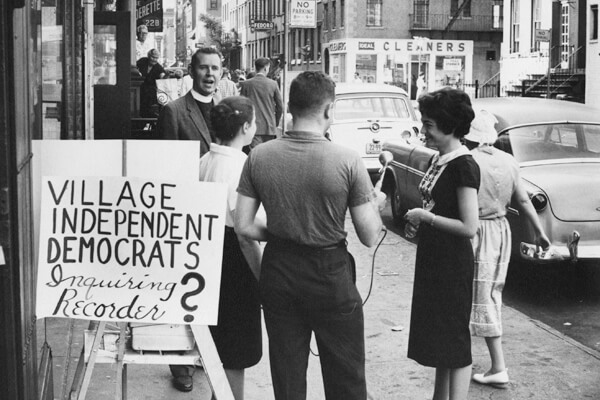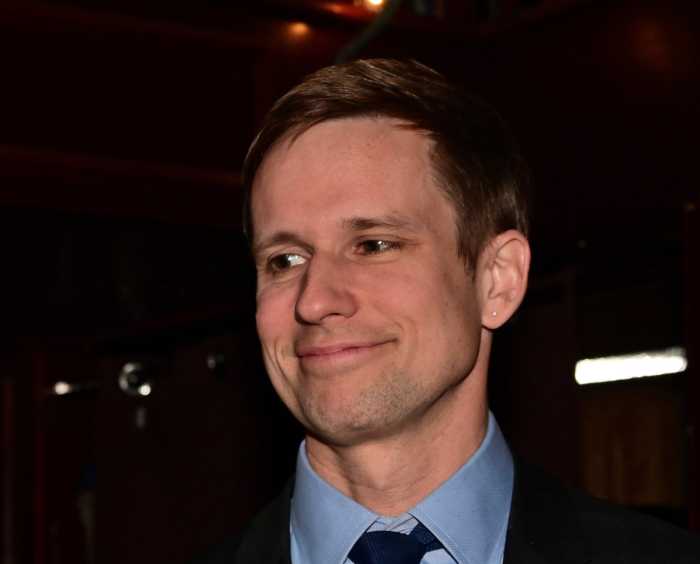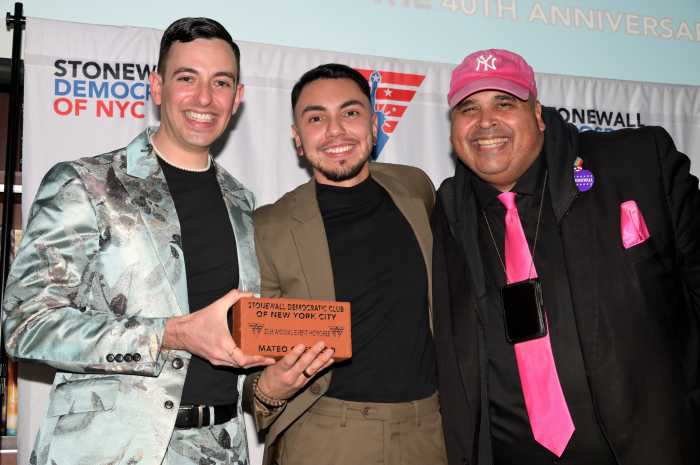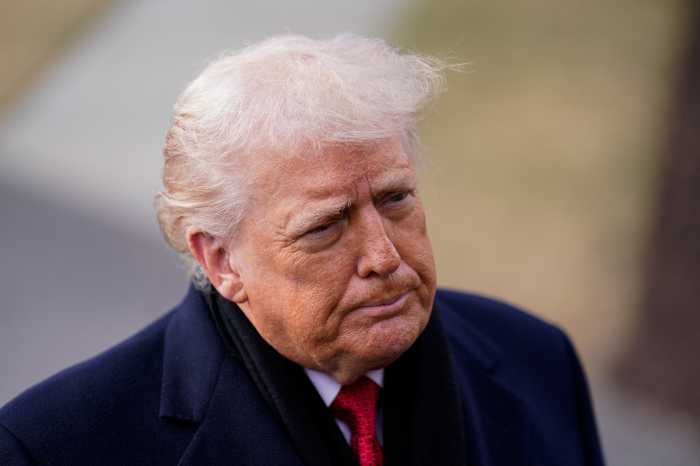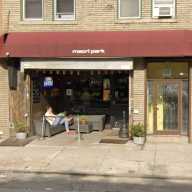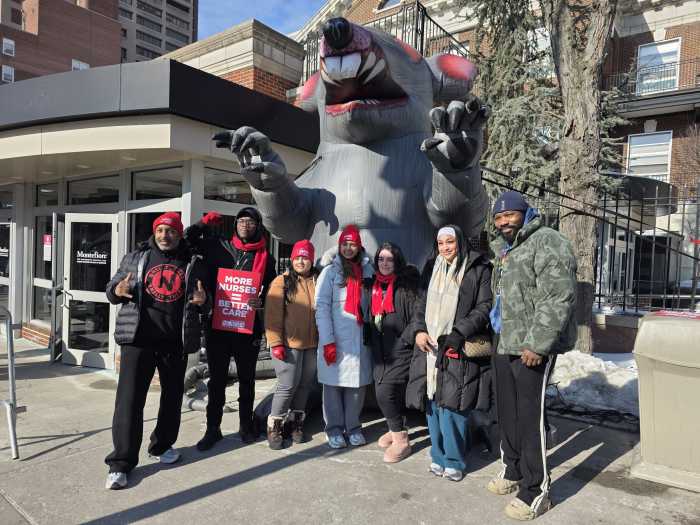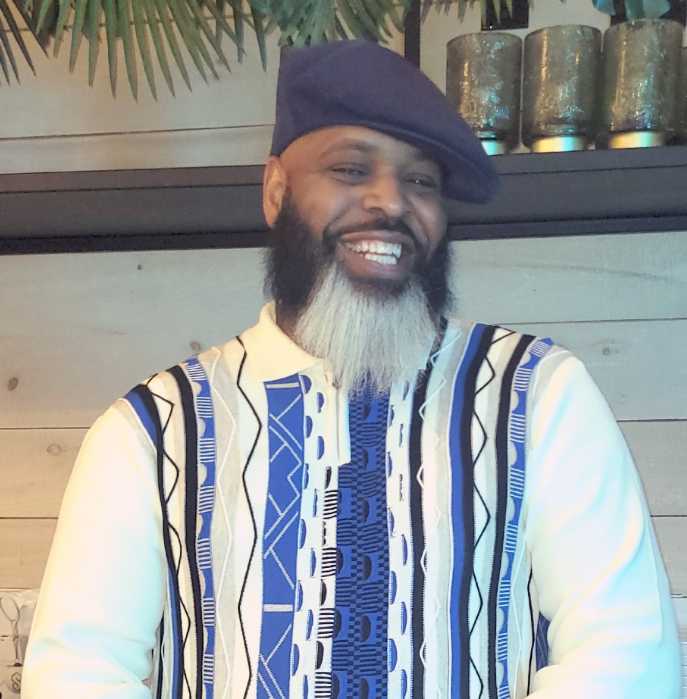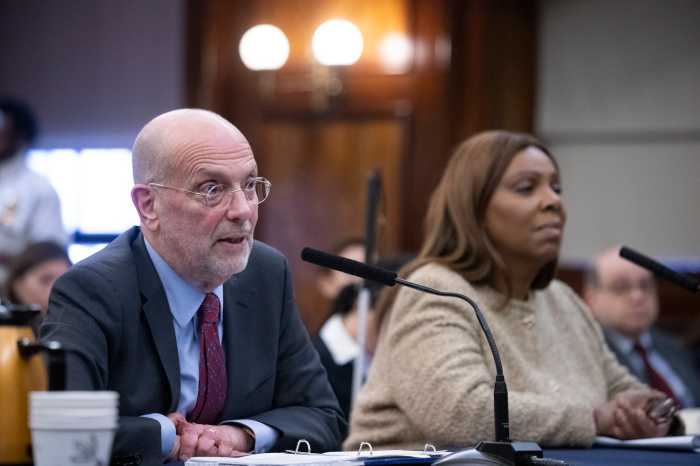The Reverend Howard Moody engaged in his political activism at the Village Independent Democrats. | COURTESY: PAUL RUSSELL/ JUDSON MEMORIAL CHURCH
The Reverend Howard Moody, who, as pastor of the Judson Memorial Church on Washington Square South from 1956 to 1992, made it the heart and soul of the Village and New York, died September 12 at age 91 from pneumonia and complications from treatment for cancer.
Moody was a Baptist minister from Texas and ex-Marine with a crew cut who did not fulfill the stereotypes either of those descriptions suggest.
Leslie Dennis, a longtime parishioner and former secretary at Judson, said, “In the mid 1950s, as the Baptist campus minister at the Ohio State University, Howard was outraged at authorities’ entrapment of young male students in the restroom of Arps Hall, a well known cruising location. He protested and did what he could in that era to help these young men. Years later, he was still outraged.”
Before Stonewall, Moody hired an assistant pastor who was gay, Al Carmines, who described himself as “polymorphous perverse.” Carmines’ musical “The Faggot” played at Judson in 1973, with Carmines as Oscar Wilde, and went on to a run at the Truck and Warehouse Theater on East Fourth Street.
After a gay liberation service in 1972, Moody wrote in his memoir, “I realized how blessed we were by those gay and lesbian persons who found their way into our congregational life. They were among us as ordained ministers and laity, as Sunday School teachers and public school educators, as choir members and professional singers. As a matter of fact, they were not among us — they were us, and that made all the difference. And it was not just the congregation that was blessed, but my own family. I was so proud that our children, as they were growing up, were surrounded and mentored by our gay and lesbian friends in the congregation.”
Starting when he arrived at the church, he referred women in need of abortion — illegal in New York until 1970 — to safe providers, setting up, in 1967, the Clergy Consultation Service on Abortion network to help them. He succeeded in getting the New York Times to write about the network — protecting its participants by coming out. He was not arrested.
When the city gay rights bill was killed in 1974 by a campaign led by Cardinal Terence Cooke, Moody, in “Christianity and Crisis,” wrote, “The cardinal’s position is not only morally and socially repugnant but also theologically unsound. Any ethical stance on the part of a prince of the church that talks about ‘we’ and ‘they’ as separate states is foolish in the extreme; there is no ‘they’ — either worse (less beloved of God) or better (more beloved of God).”
When the AIDS epidemic hit in 1981, Judson was uniquely situated to provide services. In 1959, Moody had established the first drug treatment clinic in the Village. And in 1976, the church founded the Center for Medical Consumers. Abigail Hastings, a parishioner for more than 25 years, said it was based on the principle that “people should know what’s going on with their bodies and have a say in their treatment.” Some of the first participants were in a breast cancer cluster that emerged among the congregants.
In the absence of viable treatments for AIDS in 1987, Michael Callen, Tom Hannan, and Dr. Joseph Sonnabend formed the PWA Health Group to distribute untested treatments such as egg lipids that showed promise and were not known to cause harm. The legally risky venture, which Callen got Judson’s Arlene Carmen and me, among others, to serve as board members, was launched at a press conference at Moody’s church. Again, no one was arrested.
As Moody wrote, “Our ministry to PWAs was no different from the help extended to the desperate woman from Florida who needed a safe abortion, or the working women of mean streets who appreciated a warm place to sit and share pictures of their children, or neighborhood kids addicted to heroin — we were presented with opportunities to alleviate suffering, and that was motive enough. I don’t begrudge the time it took for many to warm up to and trust us in what we were doing — how could they not be suspicious of what we might want in return? Our conversion stories were of people who were returned to, or at least had a glimpse of, the wholeness of their lives — and that made our work not only a source of joy, but a privilege to witness.”
David Rothenberg, the veteran gay activist and publicist, organized that press conference. He himself joined the church a quarter century ago.
“This agnostic Jew used to go to Sunday services because he wasn’t just my political hero — he was my social conscience hero,” Rothenberg recalled.
Moody did not shy away from politics and was a leader of the Village Independent Democrats when it ousted Carmine DeSapio, the last leader of the Tammany Hall machine, as district leader.
“His Sunday sermons made you want to get out and do things. He zeroed in on social issues,” Rothenberg said. “I envied his deep faith. He respected differences. He was a human being.”
He added, “He gave an incredible sermon on the Holocaust and said it didn’t just happen with Hitler, but had a historic, systemic aspect to it in terms of anti-Semitism rooted in religion in Germany from the time of Martin Luther and it was inevitable.”
Rothenberg also said, “Howard did gay pride week before anyone else had celebratory services. He accepted people and didn’t believe in labels. There was an absence of judgment. He looked for the qualities in people that were admirable and human.”
Hastings said, “He listened to people and what they needed — and created a place without censorship. That segues into how he felt about homosexuality — a group of people he saw as persecuted for no good reason.”
According to Dennis, during the AIDS crisis, “Howard personally conducted numerous memorial services for members and friends of the Judson community, and made it a ministry of the church to give free meeting space to countless friends and families of people who died of AIDS when many churches refused. And he gave support to and counseled one of our members with AIDS who chose to commit suicide. The Garden Room at Judson Church was one of the sites used for the secret community Compound Q [drug] trial, which happened in spite of any concerns about its legality. This could not have happened without Howard’s full knowledge and support. Even so, we were anxious about this.”
When Judson wanted to officially become part of the welcoming and affirming caucuses of the denominations with which they were affiliated, American Baptist and United Church of Christ, the church was asked to go through a course of study on LGBT issues.
“Howard said at a board meeting he didn’t think we needed it,” Hastings said, because the church had been welcoming for so long already. “Our response was practical or arrogant or both,” she said.
Hastings said Moody firmly believed in the Baptist principle of “soul freedom — that there is no one between you and God — and the autonomy of the local church.”
In 2004, as political battles over same-sex marriage were heating up in referendums around the country, Moody published “Sacred Rite or Civil Right” in the Nation. He argued that President George W. Bush had a right to look to his Christianity to support a constitutional amendment barring marriage by same-sex couples, “but as the president of the United States and leader of all Americans, believers and unbelievers, he is wrong.”
In Hastings' view, “He was not a knee-jerk liberal. You never knew where he was going to land.”
Moody was married for 68 years to Lorraine McNeill Moody, but, “He would say, ‘Why would you want to get married and ruin a good friendship?,’” Hastings recalled. “He felt if you’re going to marry someone, it is a covenant relationship and you shouldn’t go into it lightly.”
Dave Johnson, an out gay member of the church who joined in 1967, said that when Moody came to the church in 1956, gay people were not that open even in the Village. “Howard had to think about it for himself,” Johnson said, “and he went back to his experience in the Marines where he had met people who were gay.” Moody served in the South Pacific in World War II. “Howard felt the church was for the people who were not in it,” Johnson added.
Moody must have done a good job of attracting gay people because the church now estimates that about a third of its congregants are LGBT and one of the senior pastors who succeeded him, Peter Laarman, was an out gay man.
Gay civil libertarian Bill Dobbs said, “The Judson Church under Howard Moody was an amazing cauldron of political organizing, artistic expression, and just great energy. It was a very important home for anti-war work over the years. Judson, St. Mark’s-in-the-Bowery, and Washington Square Methodist helped anti-war and other organizing flourish. One is gone and now where is the space? A question that Occupy is asking now.”
David McReynolds, a gay peace activist, remembers Judson under Moody as a scene of press conferences in defense of the right to burn the flag — without supporting that action — and about the need to impeach Richard Nixon. “The church was a base for courage,” he said. “And Howard, so modest, so solid. I wish the Marine Corps could turn out more like him.”
“By the time I came to Judson in 1978,” said Dennis, “Howard had established a worship community that was seamlessly inclusive of straight and gay, a condition that was not the norm in many communities, secular or religious. Howard consistently lifted up marginalized communities and fought for their human and civil rights.”
In addition to his wife, Moody is survived by a daughter, Deborah, a son, Daniel, their families, and the family of New York. You can read more about this remarkable man at judson.org/Howard-Moody-Obituary.
A memorial service at Judson is planned for November 10, the time to be announced. [Editor's note: In a comment posted below, Grace Goodman advises that Reverend Moody's memorial has been set for Saturday, November 10 at 11 a.m.]

